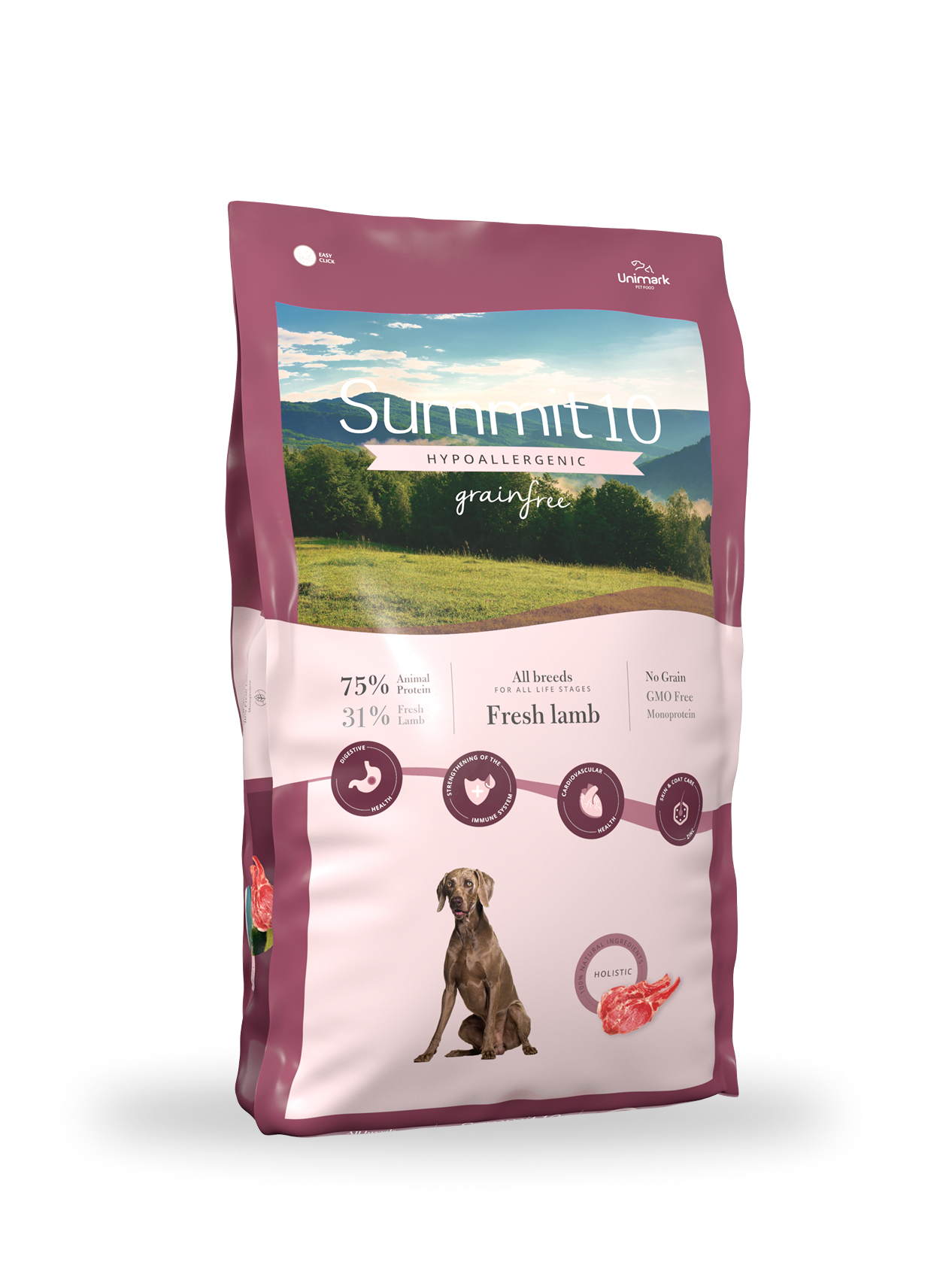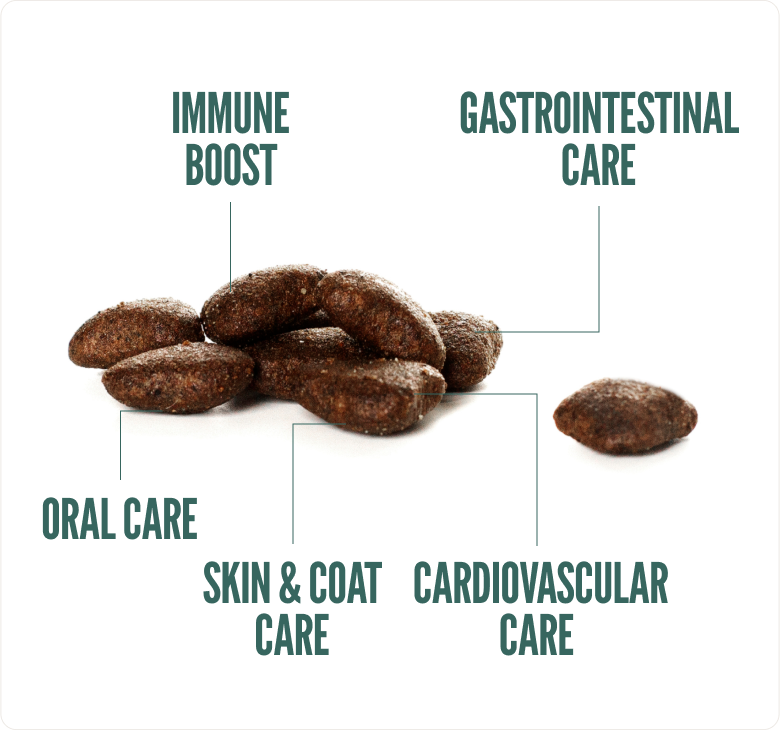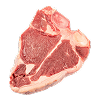
With lamb and sweet potato as main ingredients to minimize the risk of possible intolerances or food allergies. Recommended for those animals with sensitive digestion or those requiring special care for their skin and coat.

Fresh lamb (31%), dehydrated lamb protein (22%), dehydrated sweet potato (15%), peas (6%), chicken fat, dehydrated potato, hydrolyzed chicken liver, beet pulp, yeast, salmon oil, Yucca schidigera, sodium chloride, sodium polyphosphates (0.3%), potassium chloride, inulin (FOS 1,000 mg/kg), ginger, mannan-oligosaccharides (MOS 260 mg/kg).
Nutritional: Vitamin A 24,000 IU/kg, Vitamin D3 1,650 IU/kg, Vitamin E 265 mg/kg, Iron (iron (II) sulphate monohydrate) 65 mg/kg, Iodine (potassium iodide) 2 mg/kg, Copper (copper (II) sulphate pentahydrate) 9 mg/kg, Manganese (manganese (II) oxide) 12 mg/kg, Zinc (zinc oxide) 75 mg/kg, Zinc (zinc chelate of glycine hydrate) 25 mg/kg, Selenium (sodium selenite) 0.2 mg/kg, L-Carnitine 50 mg/kg, Taurine 1,400 mg/kg.
Technological: Natural antioxidants: Tocopherol extracts from vegetable oils.
Zootechnical: Gut flora stabilizers (probiotics): Enterococcus faecium (NCIMB 10415) 15*10⁶ CFU/kg.
Crude protein (26%), Crude fat (16%), Crude fiber (2.5%), Crude ash (8.5%), Calcium (1.4%), Phosphorus (1%), Humidity (9.0%)


FRESH LAMB: A source of high-quality, easily digestible, and palatable proteins. It also provides vitamins (B12, B6, B3, B2, and B5) and minerals (iron, zinc, phosphorus, selenium, and copper). Overall, it contributes to muscle development (thanks to its high protein content), the formation of red blood cells (thanks to its iron and vitamin B12 content), and immune function (due to its zinc and selenium content).
CHICKEN LIVER: A source of high-quality, easily digestible, and palatable proteins. It is also a particularly rich source of vitamins (A, D, and B vitamins) and minerals (iron, zinc, copper, phosphorus, and selenium). Overall, it contributes to eye health (thanks to its high vitamin A content), immune function (thanks to its vitamin A, zinc, and selenium content), and the formation of red blood cells (due to its high iron and copper content).


FRESH LAMB: A source of high-quality, easily digestible, and palatable proteins. It also provides vitamins (B12, B6, B3, B2, and B5) and minerals (iron, zinc, phosphorus, selenium, and copper). Overall, it contributes to muscle development (thanks to its high protein content), the formation of red blood cells (thanks to its iron and vitamin B12 content), and immune function (due to its zinc and selenium content).
CHICKEN LIVER: A source of high-quality, easily digestible, and palatable proteins. It is also a particularly rich source of vitamins (A, D, and B vitamins) and minerals (iron, zinc, copper, phosphorus, and selenium). Overall, it contributes to eye health (thanks to its high vitamin A content), immune function (thanks to its vitamin A, zinc, and selenium content), and the formation of red blood cells (due to its high iron and copper content).

YEAST: A source of high-quality protein and excellent palatability. It is also particularly rich in B vitamins, minerals (selenium, zinc, magnesium, iron, and phosphorus), prebiotic compounds (mannan-oligosaccharides (MOS) and beta-glucans), and nucleotides. Overall, it contributes to improving the quality of the skin, hair, and nails (due to its content of biotin and other B vitamins), nervous system function (due to its content of B vitamins), immune function (due to its content of beta-glucans, zinc, selenium, and nucleotides), and to gastrointestinal health (thanks to its content of prebiotic fiber).
PEAS: Source of plant-based proteins, fiber (both soluble and insoluble), and complex carbohydrates (mainly starch). They also provide vitamins (B1, B6, K, and folate), minerals (iron, magnesium, potassium, zinc, phosphorus), and antioxidants (polyphenols). Overall, they contribute to digestive health (the fiber content helps regulate intestinal transit), blood sugar control (thanks to complex carbohydrates and fiber content), and the prevention of metabolic diseases (thanks to their content of antioxidants and phytogenic compounds).


POTATO: A source of complex carbohydrates (mainly starch) that are easy to digest, provides energy and allows obtaining crunchy kibbles during the extrusion process. Furthermore, potatoes are hypoallergenic and rarely cause allergic reactions.
SWEET POTATO: A source of complex carbohydrates (mainly starch) that are easy to digest and provide slow-releasing energy. It also contributes to achieving crunchy kibbles during the extrusion process. Additionally, it contains both soluble and insoluble fiber, which supports digestive health, regulates intestinal transit, and promotes satiety. Sweet potato is also an excellent source of beta-carotene (a precursor of vitamin A), which supports vision, immune function, and skin health. Moreover, sweet potatoes are hypoallergenic and rarely cause allergic reactions.

CHICKEN FAT: A highly palatable and digestible concentrated source of energy, which also provides essential fatty acids from the omega-6 family (such as linoleic and arachidonic acid), and fat-soluble vitamins (A, D, E, and K). It also contributes to the absorption of fat-soluble compounds, cellular function (since essential fatty acids are crucial for maintaining the integrity of cell membranes and the general health of the body) and maintain the health of the skin and hair.
SALMON OIL: A highly palatable concentrated source of energy, which also provides essential omega-3 fatty acids (such as EPA (eicosapentaenoic acid) and DHA (docosahexaenoic acid)), vitamin A and antioxidants
(astaxanthin). EPA helps reduce inflammation and improves cardiovascular health. And DHA is crucial for brain health, cognitive function, and eye health. In addition, vitamin D and antioxidants help strengthen the immune system.

BEETROOT: A good source of dietary fiber, which also provides antioxidants (betalains) and is a source of nitrates. Overall, it contributes to digestive health (thanks to its fiber content, it improves the regularity of intestinal transit and promotes the health of the gut microbiome), reduces inflammation and prevents the appearance of diseases caused by oxidative stress (thanks to its antioxidant content), and improves cardiovascular and cognitive health (thanks to its nitrate content, which in the body is converted into nitric oxide, that helps relax and dilate blood vessels, improving circulation).


YUCCA SCHIDIGERA: Also known as Mojave yucca, it has a high content of saponins and polyphenols, which give it antimicrobial, antioxidant, and anti-inflammatory properties. Moreover, its saponin content helps improve digestion and reduce ammonia production, thereby reducing flatulence and bad stool odor.
GINGER (ZINGIBER OFFICINALE): Contains compounds such as gingerol and shogaol that have potent anti-inflammatory effects. It also promotes digestion and relieves digestive problems such as nausea, vomiting, indigestion, and flatulence. It also has antibacterial properties that help fight infections and strengthens the immune system.
FRUCTOOLIGOSACCHARIDES (FOS): They are a type of soluble fiber that is not digested in the small intestine and reaches the large intestine intact, where it is fermented by beneficial bacteria in the gut (especially bifidobacteria and lactobacilli), generating a prebiotic effect and helping to improve the balance of the gut microbiota and, ultimately, digestive health.
MANNANOOLIGOSACCHARIDES (MOS): They are a type of polysaccharide present in the cell walls of yeasts (especially Saccharomyces cerevisiae) that act as prebiotics, promoting the growth of beneficial bacteria in the gut (especially bifidobacteria and lactobacilli) and therefore helping to improve digestive health. In addition, they stimulate the immune system, by increasing the activity of macrophages and lymphocytes, and prevent the adhesion and colonization of pathogenic bacteria (such as E. coli and Salmonella) in the gut, thanks to their ability to bind to lectins (proteins that allow pathogenic bacteria to adhere to intestinal cells).